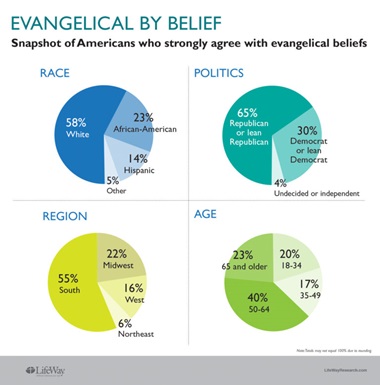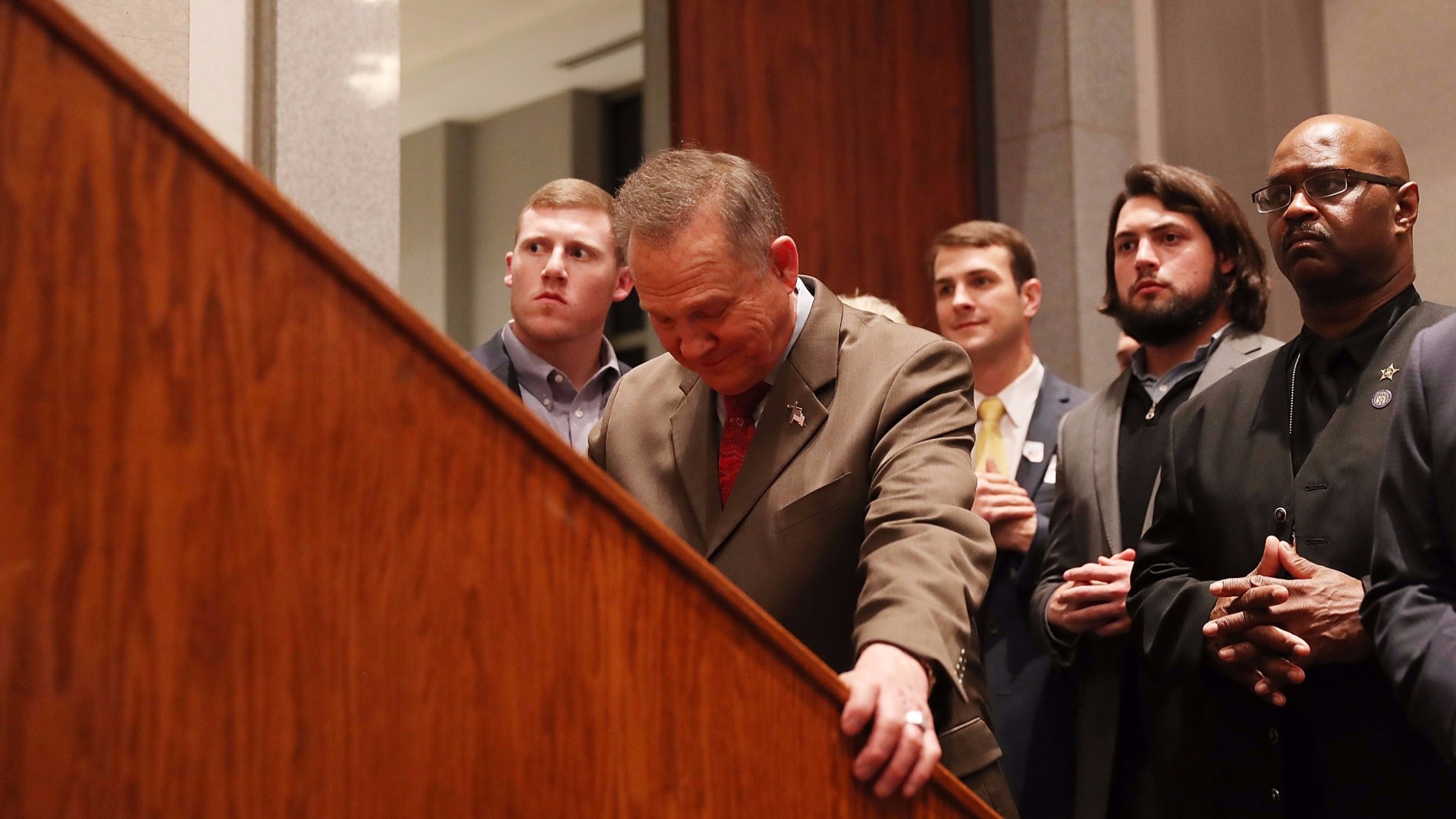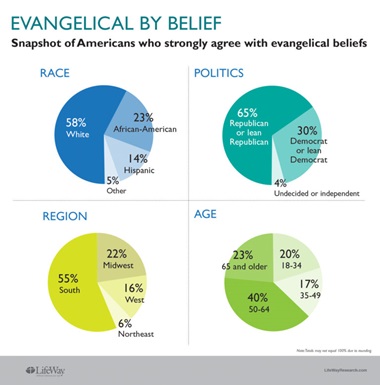“An incredible amount of evangelical Christians said this was a bridge too far.”
This is how Albert Mohler explained to CNN, live at 1 a.m., the unexpected loss of Roy Moore to Doug Jones in Alabama’s special election for US Senate. “It’s nothing less than stunning.”
As expected, the state’s white evangelicals mostly voted for the Republican candidate—by a wide 4–1 margin (80% Moore vs. 19% Jones). However, enough of the Heart of Dixie’s pro-life contingent voted instead for the Democratic candidate—1 in 4 (26% Jones vs. 72% Moore)—to help hand the pro-choice politician the surprising victory by a narrow 1.5 percentage points.
According to exit polls, 44 percent of Alabama voters Tuesday were white born-again or evangelical Christians (self-identified). In the last two elections with state-level exit polling, 2008 and 2012, their share was 47 percent—making them “the only group showing slight signs of slippage,” according to an analysis by The Washington Post.
“[Moore] lost because so many evangelicals didn’t show up,” Mohler told CNN anchor Don Lemon. “That’s the big story … what didn’t happen. You didn’t have any major pastors or evangelical leaders [in Alabama], not a single one, willing to support Roy Moore.
“Given the percentage of evangelicals in Alabama, it’s inconceivable that a candidate supported by them could lose,” the president of Southern Baptist Theological Seminary continued. “They would not and could not vote for a pro-abortion candidate, and they would not and could not vote for Roy Moore.” (The Post examined why.)
Two percent of conservative Republicans (which comprised 33% of voters) wrote in a third candidate other than Moore or Jones—making them likely responsible for almost 40 percent of the 22,819 write-ins, which narrowly exceeded Jones’s margin of 20,715 votes. Five percent of independents (which comprised 21% of voters) also wrote in candidates, as did five percent of voters who decided in the last few days (12% of voters).
About 1 in 4 white evangelicals likely to vote for Jones mainly disliked Moore, according to a Fox News poll conducted in the days before the election.
“It sends a signal to the Republican party. It also sends a signal to evangelicals,” Mohler told Lemon. He later analyzed the “political earthquake in Alabama” and what it revealed about “the limits of conservative tolerance on questions of character” on the Wednesday taping of his program, The Briefing. One of his most significant examples of shifted Republican votes: 2 out of 3 Alabama women with children under 18 voted for Jones instead of Moore.

Another key factor in the outcome: African Americans showed up in large numbers—comprising 29 percent of the vote—and voted nearly unanimously for Jones (96%). (The Post also examined why.)
While the exit polls don’t publicly release breakouts for blacks by religious affiliation or church attendance, LifeWay Research recently found that black Americans are almost three times more likely than white Americans to hold evangelical beliefs (30% vs. 13%), and twice as likely to self-identify as “born again” (49% vs. 27%). (At Ed Stetzer’s CT blog, the managing director of the Billy Graham Center makes the case for “how black women saved evangelicalism.”)
Moore has yet to concede the election, suggesting that there should be a recount. (State law mandates a recount if the vote falls within half a percentage point.) Alabama’s secretary of state told CNN that while either candidate could request—and pay for—a recount, it was “highly unlikely” that the result would change.
Instead of making a concession speech to his gathered supporters late Tuesday night, Moore told them that “God is always in control,” and referred to Psalm 40:
I waited patiently for the Lord—that’s what we’ve got to do—and he inclined to me and heard my cry, and brought us up also out of the horrible pit, out of the mirey clay, and set my feet on the rock and established my goings and put a new song in our mouth, giving praise to our God. Many shall see it and hear it, and shall be moved by that, if you will.
“That’s what we’ve got to do,” said Moore. “Wait on God and let this process play out.”
One of the main issues that galvanized evangelical support for Moore was abortion—a seemingly easy win, given Jones’s liberal stance on the procedure. But among Alabama voters who believe abortion should be “illegal in most cases,” 1 in 3 still voted for Jones. Overall, 1 in 4 voters who believe abortion should be illegal voted for Jones over Moore, according to the exit polls.
In an end-of-November Washington Post-Schar School poll of registered voters in Alabama (which predicted a 78-19 white evangelical split for Moore, and was the only final poll to meet FiveThirtyEight’s “gold standard”), 77 percent of self-identified white evangelicals trusted Moore to handle the issue of abortion better than Jones. However, only 27 percent said a candidate’s position on abortion would be the most important factor in their vote, while a plurality of 31 percent said health care and 22 percent said personal moral conduct. On that front, 59 percent said Moore had higher standards of personal moral conduct, while 22 percent said Jones.
Among black Protestants, the poll found that 58 percent said a candidate’s position on health care would be the most important factor in their vote, followed by 23 percent who said personal moral conduct and only 2 percent who said abortion. On which candidate was more moral, 91 percent said Jones and 5 percent said Moore.
In one of the last surveys released before the election, Fox News found that 61 percent of white evangelicals likely to vote for Jones strongly supported him, 12 percent had reservations, and 26 percent mainly disliked Moore. Among white evangelicals likely to vote for Moore, 62 percent strongly supported him, 27 percent had reservations, and 10 percent mainly disliked Jones.
Other exit poll findings:
- Among voters who strongly favored their candidate (65% of voters), 59 percent voted for Jones and 41 percent voted for Moore.
- Among those who supported their candidate with reservations (21% of voters), 70 percent voted for Moore and 29 percent voted for Jones.
- Among those who disliked the other candidate (12% of voters), 47 percent voted for Moore and 44 percent voted for Jones.
- Overall, 56 percent of voters had an unfavorable opinion of Moore and 41 percent had a favorable one. For Jones, 51 percent had a favorable opinion of him and 38 percent had an unfavorable one.
- 57 percent of voters made up their mind on who to vote for before November (when allegations of sexual misconduct against Moore first surfaced). This group split 53–46 for Jones.
- 21 percent of voters decided their vote in November. This group also split 53–46 for Jones.
- 9 percent of voters had decided earlier in December. This group split 50–47 for Moore.
- 12 percent of voters decided in just the last few days. This group split 57–38 for Moore.
Half of Alabama voters said President Donald Trump was “not a factor” in their vote, while 26 percent said their vote was to support him and 20 percent said it was to oppose him. Overall, 48 percent of voters approve of Trump (33% strongly) while 47 percent disapprove of him (40% strongly).
Meanwhile, as CT reported Monday, national evangelicals disagreed with their Alabama peers on Moore’s candidacy.
On Tuesday, Politico/Morning Consult released their latest nationwide poll of registered voters, conducted December 8–11 and including a multiethnic sample of 558 self-identified evangelicals.
The survey found, among evangelicals nationwide:
- 33 percent believe the allegations against Moore are credible, while 23 percent do not. A plurality of 44 percent said they don’t know or have no opinion.
- 52 percent believe the US Senate should have expelled Moore if he had won the race, while 22 percent believe it should not have expelled him.
- 42 percent believe it was wrong for the Republican National Committee to resume its financial support of Moore’s campaign, while 28 percent believe this was the right thing to do.
Almost 3 out of 4 evangelicals said they are willing to support a politician they personally dislike if they agree on the issues (74% willing vs. 12% not willing). When voting, 34 percent said a candidate’s character matters most to them, while 53 percent said a candidate’s policy positions matter most.
For comparison, back in Alabama, the Fox News poll found that among registered white evangelical voters in the state, the most important voting factor for 46 percent was “a candidate with strong moral character,” while for 33 percent it was “a candidate who will vote the way you would vote.”
A Monmouth University poll of Alabama likely voters, released Monday, reported:
Christian evangelical Republicans are more likely to choose a representative who votes the way they want (55%) over one who lives a moral life (36%), while evangelical Democrats and independents choose the moral person (54%) over the preferred voting record (39%).
The Washington Post-Schar School poll asked Alabama voters: “In general, do you think an elected official who commits an immoral act in their personal life can still behave ethically and fulfill their duties in their public and professional life?” Among white evangelicals, 49 percent said yes and 32 percent said no; among black Protestants, 40 percent said yes and 51 percent said no.
CT editorialized on how the biggest loser of the election was not Moore (or Jones), but Christian witness.
Additional reporting by Sarah Eekhoff Zylstra










